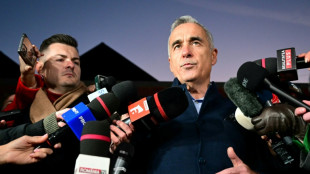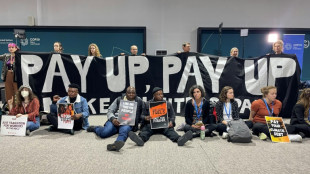
-
 Mexican actor Silvia Pinal dead at 93
Mexican actor Silvia Pinal dead at 93
-
'Black Friday' deals target inflation-weary US consumers

-
 Liverpool look to deepen Man City crisis, Amorim seeks first Premier League win
Liverpool look to deepen Man City crisis, Amorim seeks first Premier League win
-
Police fire rubber bullets, tear gas at Georgia protesters after PM delays EU bid

-
 England lose three quick wickets in reply to New Zealand's 348
England lose three quick wickets in reply to New Zealand's 348
-
Social media companies slam Australia's under-16 ban

-
 Police fire tear gas at Georgia protesters after PM delays EU bid
Police fire tear gas at Georgia protesters after PM delays EU bid
-
Canada watchdog sues Google over 'anti-competitive' ad tech

-
 Hojlund gives Amorim winning Old Trafford bow, Roma hold Spurs
Hojlund gives Amorim winning Old Trafford bow, Roma hold Spurs
-
Amorim wins first Man Utd home game after rollercoaster ride

-
 France arrests 26 as South Asian migrant trafficking ring smashed
France arrests 26 as South Asian migrant trafficking ring smashed
-
At least 15 dead, 113 missing, in Uganda landslides

-
 Netanyahu threatens 'intensive war' if Hezbollah breaches fragile truce
Netanyahu threatens 'intensive war' if Hezbollah breaches fragile truce
-
Bilbao join Lazio at Europa League summit, Chelsea cruise in Conference League

-
 In Lebanon's Tyre returning residents find no water, little power
In Lebanon's Tyre returning residents find no water, little power
-
Protests in Georgia after PM delays EU bid to 2028

-
 Biden slams Trump tariff threats as 'counterproductive'
Biden slams Trump tariff threats as 'counterproductive'
-
TikTok tactics shake up politics in Romania

-
 'He should do comedy' says Norris of Verstappen comments
'He should do comedy' says Norris of Verstappen comments
-
Americans celebrate Thanksgiving after bitter election

-
 Flood-hit Spain introduces 'climate leave' for workers
Flood-hit Spain introduces 'climate leave' for workers
-
UK's Starmer vows to slash net migration

-
 Recount order, TikTok claims throw Romania election into chaos
Recount order, TikTok claims throw Romania election into chaos
-
Jansen stars for South Africa as Sri Lanka crumble to 42 all out

-
 Bottas set for Mercedes return as Mick Schumacher quits reserve role
Bottas set for Mercedes return as Mick Schumacher quits reserve role
-
Putin threatens Kyiv with new hypersonic missile

-
 Georgia delays EU bid until 2028 amid post-election crisis
Georgia delays EU bid until 2028 amid post-election crisis
-
French PM announces concession in bid to end budget standoff

-
 Guardiola's ingenuity will solve Man City crisis, says Slot
Guardiola's ingenuity will solve Man City crisis, says Slot
-
South Africa in control after Sri Lanka crash to 42 all out

-
 'Nothing left': Flood-hit Spanish town struggles one month on
'Nothing left': Flood-hit Spanish town struggles one month on
-
Israel conducts first strike on Lebanon since ceasefire

-
 'Unrecognisable' Mbappe and Real Madrid hurting after European woes
'Unrecognisable' Mbappe and Real Madrid hurting after European woes
-
Uber and Bolt unveil women-only service in Paris

-
 French cognac workers protest China bottling plan amid tariff threat
French cognac workers protest China bottling plan amid tariff threat
-
World tennis No.2 Swiatek accepts one-month doping suspension

-
 Suaalii to start for Wallabies against Ireland
Suaalii to start for Wallabies against Ireland
-
Farrell backs youngster Prendergast at fly-half for Aussie Test

-
 Suualii to start for Wallabies against Ireland
Suualii to start for Wallabies against Ireland
-
Camavinga joins Real Madrid injury list

-
 Australia passes landmark social media ban for under 16s
Australia passes landmark social media ban for under 16s
-
Nigerian president woos French investment on state visit

-
 Contentious COP29 deal casts doubt over climate plans
Contentious COP29 deal casts doubt over climate plans
-
PSG, Real Madrid toil as giants struggle to get to grips with new Champions League

-
 Lampard appointed manager of 'ambitious' Coventry
Lampard appointed manager of 'ambitious' Coventry
-
Liberian ex-warlord Prince Johnson dies aged 72

-
 K-pop band NewJeans leaves label over 'mistreatment'
K-pop band NewJeans leaves label over 'mistreatment'
-
Sri Lanka crash to record low Test total of 42 in South Africa

-
 Putin says barrage 'response' to West-supplied missiles
Putin says barrage 'response' to West-supplied missiles
-
Lebanon MPs seek end to leadership vacuum with January presidency vote


Songs of praise: Rohingya sing Myanmar anthem 5 years after exodus
Every morning in his refugee camp school, Mohammad Yusuf sings the national anthem of Myanmar, the country whose army forced his family to flee and is accused of killing thousands of his people.
Yusuf, now 15, is one of hundreds of thousands of mostly Muslim ethnic Rohingya who escaped into Bangladesh after the Myanmar military launched a brutal offensive five years ago on Thursday.
For nearly half a decade, he and the vast numbers of other refugee children in the network of squalid camps received little or no schooling, with Dhaka fearing that education would represent an acceptance that the Rohingya were not going home any time soon.
That hope seems more distant than ever since the military coup in Myanmar last year, and last month authorities finally allowed UNICEF to scale up its schools programme to cover 130,000 children, and eventually all of those in the camps.
But the host country still wants the refugees to go back: tuition is in Burmese and the schools follow the Myanmar curriculum, also singing the country's national anthem before classes start each day.
The Rohingya have long been seen as reviled foreigners by some in Myanmar, a largely Buddhist country whose government is being accused in the UN's top court of trying to wipe out the people, but Yusuf embraces the song, seeing it as a symbol of defiance and a future return.
"Myanmar is my homeland," he told AFP. "The country did no harm to us. Its powerful people did. My young sister died there. Our people were slaughtered.
"Still it is my country and I will love it till the end," Yusuf said.
- 'Ticking bombs' -
The denial of education for years is a powerful symbol of Bangladesh's ambivalence towards the refugee presence, some of whom have been relocated to a remote, flood-prone and previously uninhabited island.
"This curricula reminds them they belong to Myanmar where they will go back some day," deputy refugee commissioner Shamsud Douza told AFP.
But when that might happen remains unclear, and visiting UN human rights chief Michelle Bachelet said this month that conditions were "not right for returns".
Repatriation could only happen "when safe and sustainable conditions exist in Myanmar", she added.
She dismissed the suggestion that the Rohingya camps could become a "new Gaza", but Dhaka is now increasingly aware of the risks that a large, long-term and deprived refugee population could present.
Around 50 percent of the almost one million people in the camps are under 18.
The government "thought educating the Rohingya would give a signal to Myanmar that (Bangladesh) would eventually absorb the Muslim minority", said Mahfuzur Rahman, a former Bangladeshi general who was in office during the exodus.
Now Dhaka has "realised" it needs a longer-term plan, he said, not least because of the risk of having a generation of young men with no education in the camps.
Already security in the camps is a major problem due to the presence of criminal gangs smuggling amphetamines across the border. In the last five years there have been more than 100 murders.
Armed insurgent groups also operate. They have gunned down dozens of community leaders and are always on the lookout for bored young men.
Young people with no prospects -- they are not allowed to leave the camps -- also provide rich pickings for human traffickers who promise a boat ride leading to a better life elsewhere.
All the children "could be ticking time bombs", Rahman told AFP. "Growing up in a camp without education, hope and dreams; what monsters they may turn into, we don't know."
- Dreams of flying -
Fears remain over whether Bangladesh may change its mind and shut down the schooling project, as it did with a programme for private schools to teach more than 30,000 children in the camps earlier this year.
Some activists condemn the education programme for its insistence on following the Myanmar curriculum, rather than that of Bangladesh.
With few prospects of return, the Myanmar curriculum was of little use, said Mojib Ullah, a Rohingya diaspora leader now in Australia.
"If we don't go back to our home, why do we need to study in Burmese? It will be sheer waste of time -- a kind of collective suicide. Already we lost five years. We need international curricula in English," he said.
Young Yusuf's ambitions also have an international dimension, and in his tarpaulin-roofed classroom he read a book on the Wright brothers.
He wants to become an aeronautical engineer or a pilot, and one day fly into Myanmar's commercial hub Yangon.
"Someday I will fly around the globe, that's my only dream."
M.Ouellet--BTB
